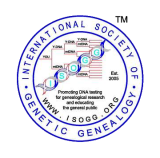Genetic genealogy 2003
From ISOGG Wiki
|
|
February 2003
Genghis Khan: about 8% of males in Genghis Khan empire region have nearly identical Y chromosomes. See: http://news.nationalgeographic.com/news/2003/02/0214_030214_genghis.html
American Journal of Human Genetics 72:717-721, 2003 The Genetic Legacy of the Mongols Zerjal, et al
March 2003
Charles Kerchner begins the Pennsylvania Dutch Ethnic Group DNA Project. This is the first ethnic group study to use biogeographical ancestry, Y chromosome DNA, mitochondrial DNA, and traditional research.
Spring/Summer 2003
Molecular Genealogy Research Project (MGRP) a.k.a. the "BYU" project, transferred to Sorenson Molecular Genealogy Foundation (SMGF). See also: http://www.smgf.org/history.jspx (History of SMGF)
May 2003
Bonnie Schrack launches a website for mtDNA haplogroup I (Iris). This was the first ever haplogroup website. At this time no companies provided facilities for haplogroup projects and Mitosearch.org had not yet been launched. The site has now been retired.
The term "Anthrogenealogy" introduced by FTDNA. Mentioned in Note 54 in: "Genealogy in the Information Age: History’s New Frontier?" by Elizabeth Shown Mills National Genealogical Society Quarterly: Centennial Issue 91. December 2003: 260-277.
June 2003
DNAPrint Genomics (see 2002) test helps investigators to suspect in string of Louisiana murders.
August 2003
"The Human Y Chromosome: An Evolutionary Marker Comes of Age" - Mark A. Jobling and Chris Tyler-Smith - the "complete" sequencing of the Y chromosome - about 23 million bases out of 50+ million (the unmapped portion is full of repetitive DNA sequences with very few landmarks to anchor them).
mtDNA "log" (Kerchner) http://www.mtdnalog.org/ See also October 2004 - http://www.mitosearch.org/
October 2003
DNA Heritage offers Y chromosome testing in October 2003 (had lab problems, resumed testing March 2004).
Dra. Ana Oquendo Pabón launches the Puerto Rican DNA project.[1] This project combines traditional genealogical research with Y chromosome DNA, mitochondrial DNA and biogeographical ancestry testing. Before the launch of the project many of the members were having their DNA testing as individuals while the administrators educated and recruited enough members in Puerto Rico and all over the USA to start a project. The earliest kit number in the project is Kit 135 which was tested in 2000. The mtDNA in this project was found to be overwhelmingly 61-64% Native American and, as a result of this finding, Family Tree DNA was finally convinced to add the supposedly "extinct" Taíno indian to their Native American reference populations.[2]
December 2003
5 December: Family Tree DNA announces the launch of Ysearch, a public database of Y chromosome DNA results.[3]
15 December: FTDNA announces the launch of its new 37-marker Y-chromosome DNA test.[4]
Duerinck lists 830 Y chromosome DNA surname projects or one-name studies (29 December 2003).
FTDNA site reports 750 surname projects as of 2 January 2004.
Would like data from other companies to include here.
Other developments in 2003
African Ancestry specializes in connecting Y and mtDNA profiles to specific places in Africa.
Trace Genetics specializes in the analysis of Native American ancestry.
References
- ↑ Dra. Ana Oquendo Pabón Message posted on the Genealogy DNA mailing list, 2 November 2003.
- ↑ Dra. Ana Oquendo Pabón. [http://archiver.rootsweb.ancestry.com/th/read/genealogy-dna/2006-10/1160183290 Message posted on the Genealogy DNA mailing list, 6 October 2006.
- ↑ Facts and Genes from Family Tree DNA. Volume 2, Issue 11, December 5, 2003. From the Internet Archive.
- ↑ Facts and Genes from Family Tree DNA. December 15, 2003, Volume 2, Issue 12 (archived version from the Pace-L mailing list).
